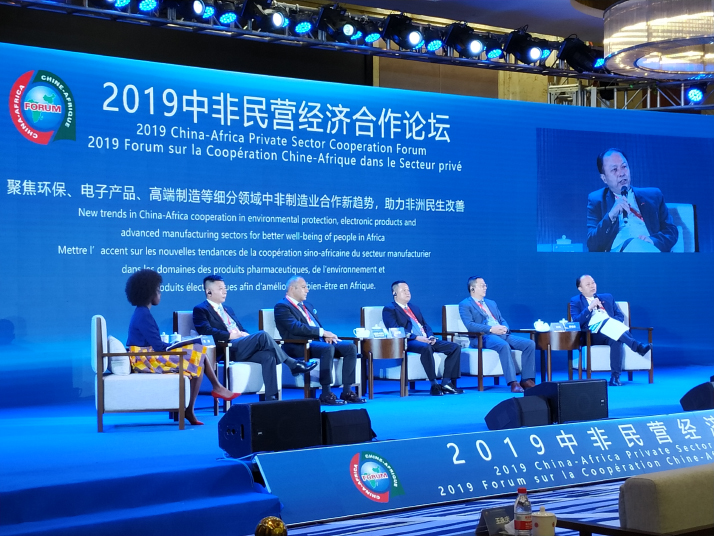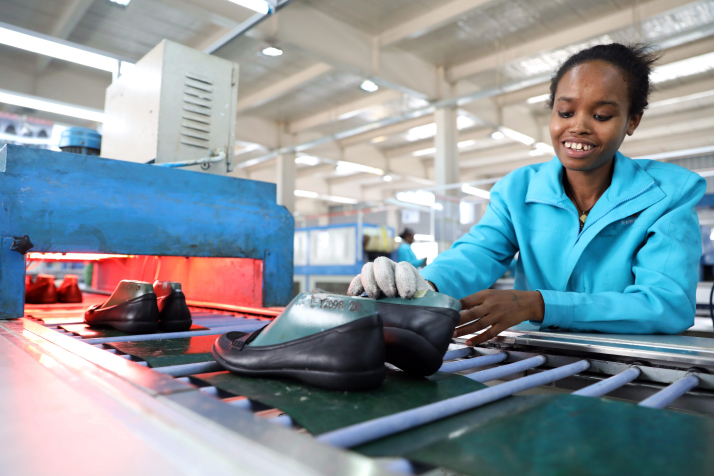|
||||||||||
| Home Nation World Business Opinion Lifestyle ChinAfrica Multimedia Columnists Documents Special Reports |
|
||||||||||
| Home Nation World Business Opinion Lifestyle ChinAfrica Multimedia Columnists Documents Special Reports |
| ChinAfrica |
| Rise of Private Sector |
| Improved business climate in Africa is facilitating a boom in private investments on the continent |
| By Li Xiaoyu | VOL.11 August ·2019-07-27 |

The 2019 China-Africa Private Sector Cooperation Forum held in Changsha, Hunan, in late June (LI XIAOYU)
In 1997, when overseas investment was not yet a trend among Chinese private companies, King Deer Cashmere Co., Ltd., a private company based in north China's Inner Mongolia Autonomous Region, set up operations in Madagascar. The local government facilitated the company's development by providing support in various aspects, including the construction of its first plant on the island.
Twenty years later, King Deer employs 6,500 people, and 85 percent of its technicians are locals. Thanks to its development, the local textile industry contributes 20 percent to job creation and 30 percent to industrial value added in the country.
Its CEO Zheng Haosheng spoke highly of their flourishing operation in Madagascar in front of the participants of the 2019 China-Africa Private Sector Cooperation Forum, held on June 28 as part of the First China-Africa Economic and Trade Expo in Changsha, Hunan Province.
Lion's share
The development process of King Deer reflects the growth of an increasing number of Chinese private companies on the continent. They now account for more than 70 percent of Chinese investment in Africa, both in terms of the number of companies and the amount of investment. In comparison, between 1990 and 2003, most Chinese companies with investment on the continent were state-owned enterprises, according to Qian Keming, Vice Minister of Commerce of China.
Private companies were content to just export their products to Africa in the past, but they are now ready to relocate production there, according to Wang Licheng, Chairman of the China-Africa Business Council, organizer of the forum. He noted that this would better meet the real needs of African consumers and extend the life cycle of products.
Many of these companies operate in labor-intensive industries, such as textiles, shoemaking, hardware or home appliance manufacturing. Their investment is better able to create jobs and thus foster local economic growth, said Wang.
This is the case of Huajian Group, one of the largest footwear producers in the world, which established its Huajian International Shoe City branch in Ethiopia in January 2012. With an annual output of around 3 million pairs of shoes, the factory has installed nine production lines and employs nearly 8,000 people. It now contributes more than 50 percent of the country's shoe export value. It also supports other sectors such as the leather industry, transport and logistics.

A local works in Huajian International Shoe City in Addis Ababa, Ethiopia (WANG TENG)
Business-friendly climate
But the expansion of the Chinese private investment in Africa did not happen in isolation. In fact, in recent years, African countries have become more aware of the importance of attracting overseas private investment. Indeed, the private sector is the main driver of growth. A number of factors have combined to provide an environment conducive to the expansion of the private sector, which, in turn, stimulates economic growth, said Laurent Gangbes, Director General of the Benin Investment and Export Promotion Agency.
It is in this spirit that the Government of Benin has taken the initiative to put forward a strategic framework for national policy on the promotion of private investments for the period from 2019 to 2025. As part of the initiative, several strategies have been adopted concerning improvement of the business climate, the deepening of the ongoing reforms and the strengthening of supporting infrastructure construction for economic activities.
The same spirit is behind the establishment of a regulatory framework incentive by the Government of the Democratic Republic of the Congo (DRC) to better support foreign investors, including Chinese companies.
One of the concrete measures is the creation of a one-stop service mechanism that allows any investors to have access to all the elements they need to set up businesses. "Starting a business in the DRC takes only three days, with the cost of $80 for a company," said Anthony Nkinzo Kamole Bahirwe, Director General of the National Agency for the Promotion of Investments in the DRC.
"The Investment Code guarantees equal treatment to all domestic and foreign investors. A Congolese investor and a foreign investor cannot be treated differently," he stressed.
The code also guarantees the rights of investors: No subsequent legal or regulatory provisions can undermine or restrict the benefit previously legally granted to an investor.
"We also guarantee legal security and even judicial security in accordance with certain treaties," he said. The DRC is, among others, a member of the Multilateral Investment Guarantee Agency, a subsidiary of the World Bank Group, which protects international investors against non-commercial risks.
Room for improvement
While recognizing the contribution of the Chinese private sector and the efforts of local authorities, the participants of the China-Africa Private Sector Cooperation Forum also talked about their expectations and perspectives on investing in Africa. Xiao Fei, CEO of Futong Group, expressed some concerns related to investment in Africa. "We need a stable political environment, safe working conditions, and a system that ensures the security of capital."
For his part, Bahirwe wants more transfer of skill and technology from Chinese companies. "China has to leave its mark, not only with infrastructure, but also with know-how, so that our future generations can say that we got something from the Chinese and we cherish that," he said.
For him, language is probably one of the main barriers. "But there are still technology transfers. We have Congolese who come to learn the language and the techniques and it is very important," he noted.
"Our wish is to develop as China has been able to do," concluded Bahirwe, who finds that his country is already exporting more.
(Comments to lixiaoyu@chinafrica.cn)
|
||||||||||||
| About Us | Contact Us | Advertise with Us | Subscribe |
| Copyright Beijing Review All rights reserved 京ICP备08005356号-5 京公网安备110102005860号 |